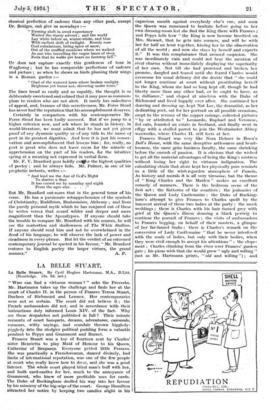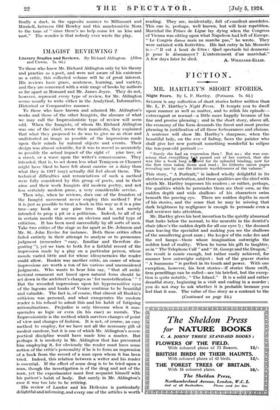LA BELLE STUART.
La Belle Stuart. By Cyril Hughes Hartmann, M.A.," B.Litt. (Routledge. 12s. 6d. net.) " WHO can find a virtuous woman 't " asks the Proverbs. Mr. Hartmann takes up the challenge and finds her at the court of Charles II. in the person of Frances, Teresa Stuart, Duchess of Richmond and Lennox. Her contemporaries were not so certain. The court did not believe it ; the French ambassadors did not, and in accordance With their instructions duly informed Louis XIV. of the fact. Why arc these despatches not published in full ? Their minute accounts of court banquets, dreams, adventures; carousals, rumours, witty sayings, and scandals thrown higgledy- piggledy into the stodgier political pudding form a valuable pendant to Pepys and Grammont and Burnet.
Frances Stuart was a toy of fourteen sent by Charles' sister Henrietta to play Maid of Honour to his Queen, Catherine of Braganca. Everyone petted little Frances. She was practically a Frenchwoman, danced divinely, had limbs_ of international reputation, was one of the few people at court who really knew how to dress, and she was a good listener. The whole court played blind man's buff with her, and built card-castles for • her, much to the annoyance of Grammont, who knew of more profitable uses for cards. The Duke -of Buckingham drolled -his way into her favour by his miniicry of the big-wigs of the court. George Hamilton attracted her notice by keeping two candles alight in his
capacious mouth against everybody else's one, and soon the Queen was. rumoured to hesitate before going to her, own dressing-room lest she find the King there with Frances ;' and Pepys tells how " the King is now become besotted on, Mrs. Stewart, that he gets into corners, and will be with her for half an hour together, kissing her to the obaervation of all the world ; and now she stays by herself and expects it." It was this complaisance that aroused suspicion. She was inordinately vain- and could not bear the mention of rival charms without immediately displaying the superiority of her own. Not till she had promised and broken her promise, dangled and teased until she feared Charles would overcome his usual delicacy did she decide that " she could not longer continue at court without prostituting herielf to the King, whom she had so long kept off, though he had liberty more than any other had, or he ought to have, as to dalliance," and eloped at nineteen with the Duke of Richmond and lived happily ever after. She continued her dancing and dressing up, kept Nat Lee, the dramatist, as her dedicating poet, sat for her portrait on all possible occasions, crept to the reverse of the copper coinage, collected pictures " by or attributed to " Leonardo, Raphael and Veronese, fed cats, founded an estate in Scotland, and finally went in effigy with a stuffed parrot to join the Westminster Abbey waxworki, where Charles II. still leers at her. - Frances Stuart was very like Nora Helmer in Ibsen's Doll's House, with the same deceptive artlessness and heart- lessness; the same grim business faculty, the same shrinking before all onrush of passion. It is obvious that she wished to get all the material advantages of being the King's mistress without losing her right to virtuous indignation. The calculating strain that alone kept her physically pure reminds us a little of the winter-garden atmosphere of Pamela: As history and morals it is all very tiresome, but the theme of " King Charles and the Maiden " makes an excellent comedy of manners. There is the bedroom scene of the first act ; the flatteries of the courtiers ; the jealousies of the Queen and Lady Castlemaine ; the Duke of Bucking-r ham's attempt to give Frances to Charles spoilt by the innocent arrival of those two ladies at the party ; the mock weddings ; there is Charles with his hair turned grey with grief at the Queen's illness donning a black periwig to continue the pursuit of Frances ; the visits of ambassadors to Frances begging, on behalf of their masters, a glimpse of her far-famed limbs ; there is Charles's remark on the conversion of Lady Castlemaine " that he never interfered with the souls of ladies, but only with their bodies, when they were civil enough to accept his attentions " ; the elope- ment ; Charles climbing from the river over Frances' garden gate ; his pious wish that she would grow " ugly and willing (not as Mr. Hartmann prints, " old and willing ") ; and
finally a duet, in the opposite manner to Millamant and Mirabell, between Old "Rowley and this anachronistic Nora to the tune of " since there's no help come let us kiss and part." The wonder is that nobody ever wrote the play.



















































 Previous page
Previous page